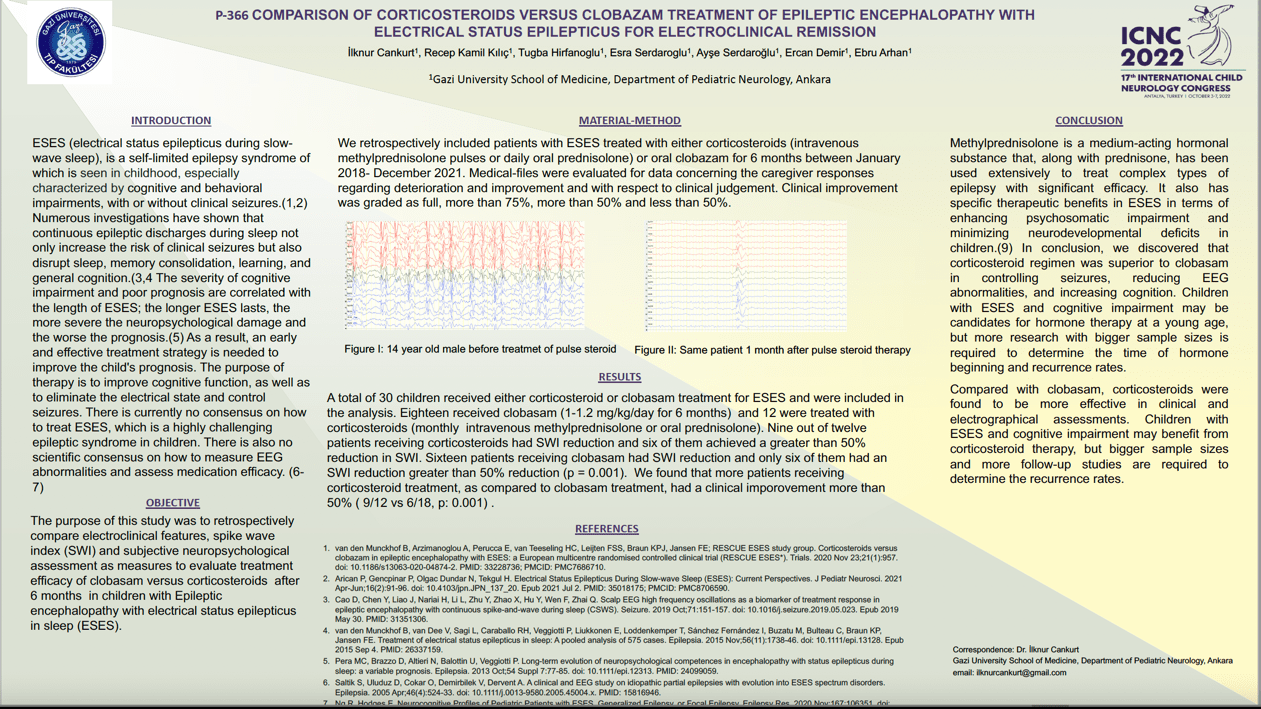COMPARISON OF CORTİCOSTEROİDS VERSUS CLOBAZAM TREATMENT OF EPİLEPTİC ENCEPHALOPATHY WİTH ELECTRİCAL STATUS EPİLEPTİCUS FOR ELECTROCLINICAL REMISSION
ilknur cankurt, Tuğba Hirfanoğlu, Recep Kamil Kılıç, Esra Serdaroğlu, Ercan Demir, Ayşe Serdaroğlu, Ebru Arhan
Objectives: The purpose of this study was to retrospectively compare electroclinical features, spike wave index (SWI) and subjective neuropsychological assessment as measures to evaluate treatment efficacy of clobasam versus corticosteroids after 6 months in children with Epileptic encephalopathy with electrical status epilepticus in sleep (ESES). Methods: We retrospectively included patients with ESES treated with either corticosteroids (intravenous methylprednisolone pulses or daily oral prednisolone) or oral clobazam for 6 months between January 2018-December 2021. Medical-files were evaluated for data concerning the caregiver responses regarding deterioration and improvement and with respect to clinical judgment. Clinical improvement was graded as full, more than 75%, more than 50% and less than 50%. Results: A total of 30 children received either corticosteroid or clobasam treatment for ESES and were included in the analysis. Eighteen received clobasam (1-1.2 mg/kg/day for 6 months) and 12 were treated with corticosteroids (monthly intravenous methylprednisolone or oral prednisolone). Nine out of twelve patients receiving corticosteroids had SWI reduction and six of them achieved a greater than 50% reduction in SWI. Sixteen patients receiving clobasam had SWI reduction and only six of them had an SWI reduction greater than 50% reduction (p = 0.001). We found that more patients receiving corticosteroid treatment, as compared to clobasam treatment, had a clinical imporovement more than 50% ( 6/12 vs 5/20, p: 0.001) . Conclusion: Compared with clobasam, corticosteroids were found to be more effective in clinical and electrographical assessments.
Keywords: ESES,clobazam,steroid
ilknur cankurt
Gazi University Faculty of Medicine
Turkey
Tuğba Hirfanoğlu
Gazi University Faculty of Medicine
Turkey
Recep Kamil Kılıç
Gazi University Faculty of Medicine
Turkey
Esra Serdaroğlu
Gazi University Faculty of Medicine
Turkey
Ercan Demir
Gazi University Faculty of Medicine
Turkey
Ayşe Serdaroğlu
Gazi University Faculty of Medicine
Turkey
Ebru Arhan
Gazi University Faculty of Medicine
Turkey
Objectives: The purpose of this study was to retrospectively compare electroclinical features, spike wave index (SWI) and subjective neuropsychological assessment as measures to evaluate treatment efficacy of clobasam versus corticosteroids after 6 months in children with Epileptic encephalopathy with electrical status epilepticus in sleep (ESES). Methods: We retrospectively included patients with ESES treated with either corticosteroids (intravenous methylprednisolone pulses or daily oral prednisolone) or oral clobazam for 6 months between January 2018-December 2021. Medical-files were evaluated for data concerning the caregiver responses regarding deterioration and improvement and with respect to clinical judgment. Clinical improvement was graded as full, more than 75%, more than 50% and less than 50%. Results: A total of 30 children received either corticosteroid or clobasam treatment for ESES and were included in the analysis. Eighteen received clobasam (1-1.2 mg/kg/day for 6 months) and 12 were treated with corticosteroids (monthly intravenous methylprednisolone or oral prednisolone). Nine out of twelve patients receiving corticosteroids had SWI reduction and six of them achieved a greater than 50% reduction in SWI. Sixteen patients receiving clobasam had SWI reduction and only six of them had an SWI reduction greater than 50% reduction (p = 0.001). We found that more patients receiving corticosteroid treatment, as compared to clobasam treatment, had a clinical imporovement more than 50% ( 6/12 vs 5/20, p: 0.001) . Conclusion: Compared with clobasam, corticosteroids were found to be more effective in clinical and electrographical assessments.
Keywords: ESES,clobazam,steroid
ilknur cankurt
Gazi University Faculty of Medicine
Turkey
Tuğba Hirfanoğlu
Gazi University Faculty of Medicine
Turkey
Recep Kamil Kılıç
Gazi University Faculty of Medicine
Turkey
Esra Serdaroğlu
Gazi University Faculty of Medicine
Turkey
Ercan Demir
Gazi University Faculty of Medicine
Turkey
Ayşe Serdaroğlu
Gazi University Faculty of Medicine
Turkey
Ebru Arhan
Gazi University Faculty of Medicine
Turkey

ilknur cankurt
Gazi
University Faculty of Medicine Turkey
University Faculty of Medicine Turkey